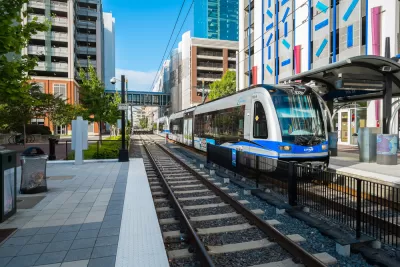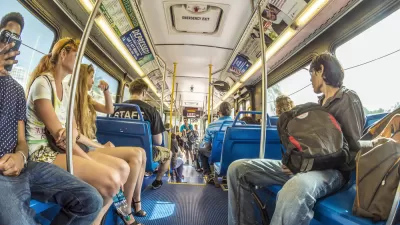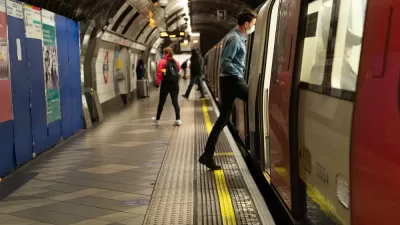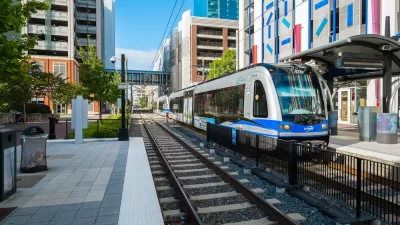The agency's CEO says the system needs more funding to make service improvements and make the shift to an electrified fleet.

With transportation making up 40 percent of the Charlotte region's carbon emissions, the local transit agency is calling for a sales tax increase to fund more sustainable transit and encourage a mode shift to its rail and bus services.
As David Boraks reports, the head of the Charlotte Area Transit System (CATS), along with other city leaders, has proposed a 1-cent sales tax increase that would fund Charlotte's mobility network. The agency wants to improve service frequency, buy an additional 100 buses, and hire more operators and mechanics. "At the moment, the system remains hobbled by the coronavirus pandemic. Ridership is stagnant and worse, CATS is facing staff shortages due to illness as well as a high number of vacancies in existing positions."
CATS CEO JOhn Lewis highlighted the importance of getting more people to ride buses and trains: "We're doing things, where we're converting our fleet to electric buses. And we can talk about that if you want. But the best thing that we can do to help is to have a system that is so reliable that people want to get out of their cars."
The proposal faces doubts from some local communities who worry they won't benefit and may not reach the ballot this November.
FULL STORY: Public transit is a climate change tool, but CATS chief says he needs funding to make it better

Maui's Vacation Rental Debate Turns Ugly
Verbal attacks, misinformation campaigns and fistfights plague a high-stakes debate to convert thousands of vacation rentals into long-term housing.

Planetizen Federal Action Tracker
A weekly monitor of how Trump’s orders and actions are impacting planners and planning in America.

San Francisco Suspends Traffic Calming Amidst Record Deaths
Citing “a challenging fiscal landscape,” the city will cease the program on the heels of 42 traffic deaths, including 24 pedestrians.

Defunct Pittsburgh Power Plant to Become Residential Tower
A decommissioned steam heat plant will be redeveloped into almost 100 affordable housing units.

Trump Prompts Restructuring of Transportation Research Board in “Unprecedented Overreach”
The TRB has eliminated more than half of its committees including those focused on climate, equity, and cities.

Amtrak Rolls Out New Orleans to Alabama “Mardi Gras” Train
The new service will operate morning and evening departures between Mobile and New Orleans.
Urban Design for Planners 1: Software Tools
This six-course series explores essential urban design concepts using open source software and equips planners with the tools they need to participate fully in the urban design process.
Planning for Universal Design
Learn the tools for implementing Universal Design in planning regulations.
Heyer Gruel & Associates PA
JM Goldson LLC
Custer County Colorado
City of Camden Redevelopment Agency
City of Astoria
Transportation Research & Education Center (TREC) at Portland State University
Jefferson Parish Government
Camden Redevelopment Agency
City of Claremont





























